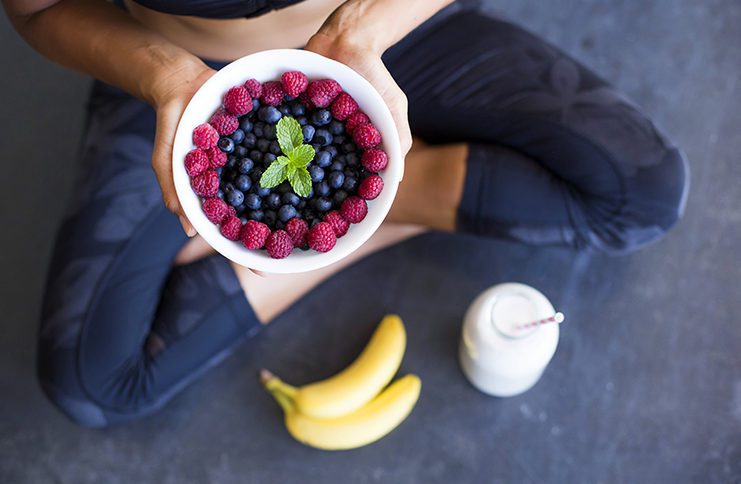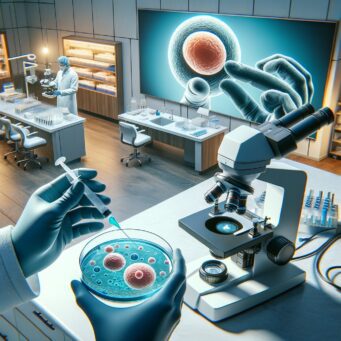
There never seems to be enough time to do everything on your to-do list, and that includes eating right. Maybe you grab some deli food for lunch when you get a few minutes break at work, eat sugar- or salt-loaded snacks throughout the day, order take-out for dinner, down a few coffees to stay energized, then relax late in the evening with a few glasses of wine. You should be able to enjoy your food, but a fast-paced life and too many unhealthy food choices may be a factor in the sensitive issue of infertility.
Chronic exposure to stress and unhealthy eating can lead to hormonal imbalances. Here are the facts: When you’re trying to conceive, these imbalances make the goal of creating a new life more challenging than expected. Both men and women can have unbalanced hormonal systems; men can suffer low testosterone levels and low sperm production while women can have progesterone deficiency leading to menstrual irregularities, making it difficult to determine when they are ovulating.
Colorful whole foods bring with them nutritional strength that promotes hormonal balance.
When hormonal imbalance becomes a fertility issue, it’s important to pay closer attention to what you’re eating and drinking. You need to provide essential nutrients to the stressed endocrine system to help your body regain balance. For example, the key nutrients to look for (and a food high in each) include vitamin B6 (avocado), zinc (hemp seeds), magnesium (almonds), and iron (lentils).
But when you’re busy or stressed, it’s not uncommon to reach for less healthy food options that don’t have much nutritional value. To make better choices, try to be more conscious about what you are putting in your body, and have a plan.
Here are 5 goals for healthier eating (and conceiving):
1) Reduce Inflammation
Select whole foods: they are like money in the bank to your body. When you eat something that is commercially processed, it doesn’t just lack the nutrients to rebuild the cells of your body, it actually robs your body of nutrients. Processed foods contribute to inflammation in the body that leads to many symptoms of illness. Take time to make this lifestyle change: removing refined food has been shown to reduce anxiety and depression so it will be a happy adjustment!
Try to eliminate:
- Refined sugars (white sugar, high fructose corn syrup, etc.)
- Refined flours (white bread, pasta, cookies, muffins, etc.)
- Trans-fats, refined oils, commercially made mayonnaise and margarine
- Processed meats, commercially raised meats and poultry that has been raised with antibiotics and processed with chemicals
2) Love Your Liver
The liver plays an important part of almost every function in the body (more than 1,000 functions!), including the manufacturing of proteins to help maintain blood volume; metabolizing and storing carbohydrates; producing and secreting bile so the body can absorb fats and the fat-soluble vitamins A, D, E, and K; and detoxifying drugs, alcohol, and environmental toxins; and metabolizing your sex hormones. By nutritionally supporting your liver, you help it work more smoothly.
Here’s what to enjoy and what to avoid:
- Avoid alcohol, fried foods, and high fructose corn syrup; you’ll take the stress off the liver.
- Enjoy more cruciferous veggies i.e. broccoli, cabbage and kale; you’ll provide the phytonutrients such as indole 3 carbinol that helps to balance hormones.
- Eat bitter greens (i.e. dandelion, endive, and artichokes); you’ll flush toxins by producing extra bile.
3) Cut Back on Caffeine
Cortisol is required for many functions in the body including proper glucose metabolism and insulin release, regulation of blood pressure, and regulation of the immune system and the inflammatory response. It is released during times of stress. Similarly, when you ingest caffeine, you force the adrenals to discharge cortisol into the bloodstream. If the adrenals are chronically taxed by daily overconsumption of caffeine, hormone production decreases. Considering all the functions that cortisol assists in the body, hormone reduction can lead to more serious issues such as high blood pressure, blood sugar imbalance, and a suppressed immune function.
If you have to have a morning Joe, try to keep it to one cup a day (under 300 mg of caffeine). To help you wean off coffee, try organic green tea, which contains only 33 mg a cup.
4) Pick Fish Wisely
Fish is a wonderful source of protein and essential fatty acids that are excellent for overall health, but you should avoid toxins (toxic levels of heavy metals) that can be found in many species, especially if you’re trying to get pregnant. Choose to use sustainable fish for your region recommended by Seafood Watch or SeaChoice and get information about healthy fish choices from accredited outlets.
If you use canned fish, be sure it is packed in BPA-free cans, as many brands use the BPA toxin in the plastic barrier between the metal and the fish. Also, be sure to stick to small fish that are low in toxins.
5) Eat a Rainbow
(Go for bright colored foods over white foods!)
We have all heard the advice: “Eat a rainbow for health.” Beyond being a feast for the eyes, colorful whole foods bring with them nutritional strength that promotes hormonal balance. By eating a rainbow of foods, you are sure to ingest nature’s finest multi-vitamins that will improve your chances at conception.
Here’s what to look for:
- Vitamin A foods are most often yellow and orange (carrots, squash, pumpkin, yams, mangoes)
- Vitamin B foods are most often green (asparagus, green beans, chard, spinach)
- Vitamin C foods are often red (red peppers, berries, red cabbage, blood oranges, ruby grapefruit)
- Anti-oxidants are highest in blue and purple foods (blackberries, blueberries, concord grapes, figs, purple cabbage)
There is a great deal of “rainbow” crossover with nutrients. A wholesome food will have a spectrum of vitamins A, B, and C, and the pigments give a clue to the highest nutrient. So the colors in fruits and vegetables can help you learn how to fulfill your daily nutrition needs.
Of course, don’t let diet choices overwhelm you; you’ve already got a lot on your mind if you’re dealing with infertility. When possible, make a conscious choice to eat healthfully. If you have questions or feel you will be making major changes to your diet, check with your doctor or nutritionist.
Contributor
Julie Daniluk, RHN
Nutritionist Julie Daniluk, R.H.N., is the bestselling author of Meals That Heal Inflammation and Slimming Meals That Heal, which advise on allergy-free foods that taste great and assist the body in the healing process. Julie hosts the TV show Healthy Gourmet, and has appeared on many television segments, including The Dr. Oz show and The Marilyn Denis Show. Connect with Julie on twitter @JulieDaniluk and check out her free online program at juliedaniluk.com.

Listen to stories, share your own, and get feedback from the community.


















